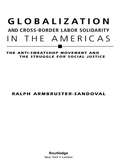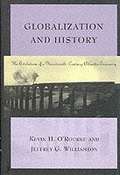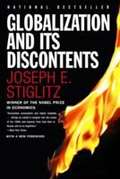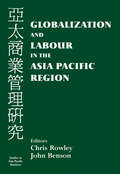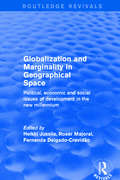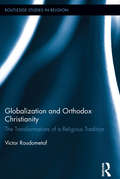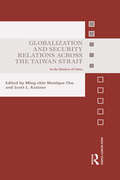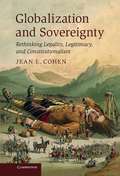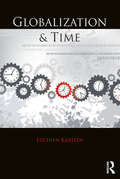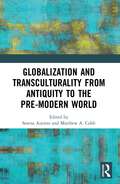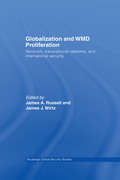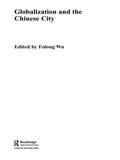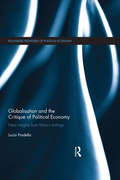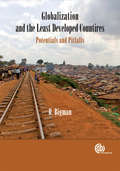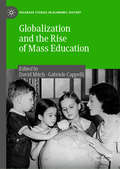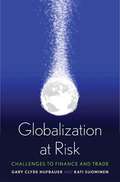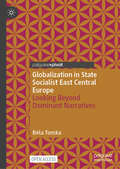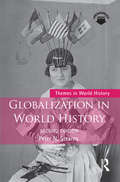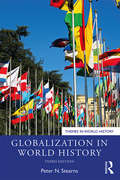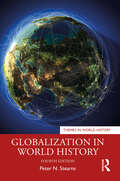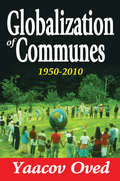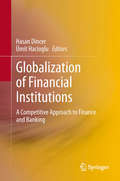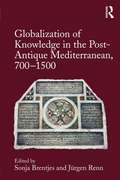- Table View
- List View
Globalization and Cross-Border Labor Solidarity in the Americas: The Anti-Sweatshop Movement and the Struggle for Social Justice
by Ralph Armbruster-SandovalFirst published in 2005. Routledge is an imprint of Taylor & Francis, an informa company.
Globalization and History: The Evolution of a Nineteenth-Century Atlantic Economy
by Jeffrey G. Williamson Kevin H. O'RourkeIn Globalization and History, Kevin O'Rourke and Jeffrey Williamson present a coherent picture of trade, migration, and international capital flows in the Atlantic economy in the century prior to 1914.
Globalization and Its Discontents
by Joseph E. StilgitzWhen it was first published, this national bestseller quickly became a touchstone in the globalization debate. Renowned economist and Nobel Prize winner Joseph E. Stiglitz had a ringside seat for most of the major economic events of the last decade, including stints as chairman of the Council of Economic Advisers and chief economist at the World Bank. Particularly concerned with the plight of the developing nations, he became increasingly disillusioned as he saw the International Monetary Fund and other major institutions put the interests of Wall Street and the financial community ahead of the poorer nations. Those seeking to understand why globalization has engendered the hostility of protesters in Seattle and Genoa will find the reasons here. While this book includes no simple formula on how to make globalization work, Stiglitz provides a reform agenda that will provoke debate for years to come. Rarely do we get such an insider's analysis of the major institutions of globalization as in this penetrating book. A new foreword for this edition.
Globalization and Labour in the Asia Pacific
by John Benson Chris RowleyGlobalization and labour market deregulation have had an impact on employment and workers, and brought pressure to bear on trade unions. This study looks at the challenges of globalization and deregulation in the Asia Pacific, and possible responses to them in a variety of ways.
Globalization and Marginality in Geographical Space: Political, Economic and Social Issues of Development at the Dawn of New Millennium
by Heikki Jussila, Roser Majoral, Fernando Delgado-CravidãoThis title was first published in 2001. An examination of globalization and marginality in geographical space, it discusses the issue of marginalization and the effects that economic globalization have on marginal and critical regions from the point of view of politics and policies and the shift from economic to social issues of development.
Globalization and Maritime Power
by Sam J. TangrediGlobalization and Maritime Power focuses on the direct impact of globalization on naval forces and the maritime aspects of commerce and international relations. It seeks to translate what we have learned about the phenomenon of globalization into the language of strategy and defense policy. This book uses a general knowledge of globalization to deduce its impact on the maritime world, and applies inductive reasoning to the maritime impacts of defense planning. Its intent is to provide national security leaders with analyses applicable to the future security environment.—Print ed.
Globalization and Military Power in the Andes
by William AvilésThrough a series of comparative case studies, the author demonstrates that the conflicts and struggles over capitalist globalization in the Andes are intricately connected to the political power of the military in the region.
Globalization and Orthodox Christianity: The Transformations of a Religious Tradition (Routledge Studies in Religion)
by Victor RoudometofWith approximately 200 to 300 million adherents worldwide, Orthodox Christianity is among the largest branches of Christianity, yet it remains relatively understudied. This book examines the rich and complex entanglements between Orthodox Christianity and globalization, offering a substantive contribution to the relationship between religion and globalization, as well as the relationship between Orthodox Christianity and the sociology of religion – and more broadly, the interdisciplinary field of Religious Studies. While deeply engaged with history, this book does not simply narrate the history of Orthodox Christianity as a world religion, nor does it address theological issues or cover all the individual trajectories of each subgroup or subdivision of the faith. Orthodox Christianity is the object of the analysis, but author Victor Roudometof speaks to a broader audience interested in culture, religion, and globalization. Roudometof argues in favor of using globalization instead of modernization as the main theoretical vehicle for analyzing religion, displacing secularization in order to argue for multiple hybridizations of religion as a suitable strategy for analyzing religious phenomena. It offers Orthodox Christianity as a test case that illustrates the presence of historically specific but theoretically distinct glocalizations, applicable to all faiths.
Globalization and Security Relations across the Taiwan Strait: In the shadow of China (Asian Security Studies)
by Scott L. Kastner Ming-chin Monique ChuThis book presents an interdisciplinary examination of cross-Taiwan Strait relations and the complex dynamics at play in the region. Since the election of Ma Ying-jeou as Taiwan’s president in 2008, the relationship across the Taiwan Strait—long viewed as one of Asia’s most volatile potential flashpoints—has experienced a remarkable détente. Whether the relationship has been truly transformed, however, remains an open question and the Taiwan Strait remains a central regional and global security issue. A return to turbulence in the Taiwan Strait could also add a new dimension of instability in the already tense maritime disputes in the East and South China Seas. While the relationship across the Taiwan Strait remains critically important, it is also changing rapidly, and the chapters in this volume present new thinking to help make sense of complex cross-Strait dynamics. Specifically, these essays explore different security and/or globalization dimensions of China-Taiwan ties as well as the globalization-security linkages that have emerged. As the balance of power in Asia shifts dramatically, several chapters in this volume explore how traditional security forces are evolving. At the same time, there are new dynamics emerging as a consequence of globalization forces, such as the tremendous economic and social integration across the Taiwan Strait, and several chapters in this volume consider some of these new problems. Finally, several chapters consider the often under-researched dynamics associated with the globalization/security interface such as cyber threats, transnational criminal networks and the security spill-over impact of production globalization. This book will of much interest to students of Chinese Politics, Asian Security, globalisation, diplomacy and International Relations.
Globalization and Sovereignty
by Jean L. CohenSovereignty and the sovereign state are often seen as anachronisms; Globalization and Sovereignty challenges this view. Jean L. Cohen analyzes the new sovereignty regime emergent since the 1990s evidenced by the discourses and practice of human rights, humanitarian intervention, transformative occupation, and the UN targeted sanctions regime that blacklists alleged terrorists. Presenting a systematic theory of sovereignty and its transformation in international law and politics, Cohen argues for the continued importance of sovereign equality. She offers a theory of a dualistic world order comprised of an international society of states, and a global political community in which human rights and global governance institutions affect the law, policies, and political culture of sovereign states. She advocates the constitutionalization of these institutions, within the framework of constitutional pluralism. This book will appeal to students of international political theory and law, political scientists, sociologists, legal historians, and theorists of constitutionalism.
Globalization and Time
by Luchien KarstenThe process of globalization has brought about countless changes in societies, communities, regions and economies across the globe. It has been analyzed from many perspectives as a result and much has been written to muddy the waters of our understanding of this important concept. In going back to the real origins of the global economy, this book demonstrates that understanding this phenomenon as a, 'battle against time' will bring a new clarity to the subject. The process of globalization was accompanied by the mastering of ‘social time’, thereby producing a progressive increase in the speed of business transactions, both in manufacturing and in services. The context is the development of international trade in western societies and the creation of business institutions to drive forward growth. The account takes a ‘long view’, beginning with early European exploration in the B.C. period, and ending with the establishment of multinational enterprises in the 20th century. Using an impressive range of sources this unique book will be valuable reading for students and academics involved with the study of international business, economic history, business history and politics, among other disciplines.
Globalization and Transculturality from Antiquity to the Pre-Modern World
by Serena Autiero Matthew A. CobbThis book explores how globalization and transculturality are useful theoretical tools for studying pre-modern societies and their long-distance connections. Among the themes explored are how these concepts can enhance our understanding of trade networks, the spread of religions, the diffusion of global fashions, the migration of technologies, public and private initiatives, and wider cultural changes. In this book, archaeologists and ancient historians demonstrate how in diverse contexts – from the Bronze Age to colonial times – humanity displayed an urge and an incredible capacity to connect with distant lands and people. Adopting and modifying approaches originally developed for the study of contemporary societies, it is possible to enhance our understanding of the human past, not only in economic terms, but also the cultural significance of such interconnections. This book provides both the wider public and the specialist reader with a fresh point of view on global issues relating to the past; in turn, allowing us to look anew at developments in the contemporary world. Its large chronological and geographical scope should prove appealing to those who want more than mere Eurocentric history. Teachers and students of world history and archaeology will find this book a useful resource.
Globalization and WMD Proliferation: Terrorism, Transnational Networks and International Security (Routledge Global Security Studies #Vol. 4)
by James J. Wirtz James A. RussellThis edited volume explores the relationship between the accelerating process of globalization and the proliferation of Weapons of Mass Destruction, which is increasingly seen as the pre-eminent threat to international security. The proliferation of Weapons of Mass Destruction has traditionally been seen as a function of the 'security dilemma' in the state-based international system. But the advent of the nuclear supply network pieced together by the Pakistani scientist A. Q. Khan represented a departure from this model, involving a variety of organizations not directly connected to a state. This volume assembles an international group of experts in order to assess the relationship between proliferation and globalization to ascertain how contemporary communication, transportation and financial networks are facilitating or constraining trade in dangerous contraband. The book ultimately seeks to determine whether globalization is fundamentally altering the nature of the proliferation problem, particularly the threat that Weapons of Mass Destruction might fall into the hands of terrorists. This book will be of much interest to students of nuclear proliferation, international security, terrorism and IR in general.
Globalization and the Chinese City (Routledge Contemporary China Series #Vol. 7)
by Fulong WuIntroducing readers to the far-reaching global orientation that is now taking place in urban China, an international team of contributors describe overarching globalization through a detailed examination of the transformation of the built environment. A range of urban development processes are analyzed including urbanization, real estate development, changing landscapes, the industrial restructuring of the second-tier city, and the formation of the city-region in the context of global and local interactions. In examining city development and local practices as part of globalization processes, the global city is treated as a collection of microcosms and concrete places, overcoming the analytical tension of the dichotomy of the perceived 'East versus West' divide.
Globalization and the Critique of Political Economy: New Insights from Marxʼs Writings (Routledge Frontiers of Political Economy)
by Lucia PradellaThe nature of the contemporary global political economy and the significance of the current crisis are a matter of wide-ranging intellectual and political debate, which has contributed to a revival of interest in Marx’s critique of political economy. This book interrogates such a critique within the broader framework of the history of political economy, and offers a new appreciation of its contemporary relevance. A distinctive feature of this study is its use of the new historical critical edition of the writings of Marx and Engels (MEGA²), their partially unpublished notebooks in particular. The sheer volume of this material forces a renewed encounter with Marx. It demonstrates that the international sphere and non-European societies had an increasing importance in his research, which developed the scientific elements elaborated by Marx’s predecessors. This book questions widespread assumptions that the nation-state was the starting point for the analysis of development. It explores the international foundations of political economy, from mercantilism to Adam Smith and David Ricardo and to Hegel, and investigates how the understanding of the international political economy informs the interpretations of history to which it gave rise. The book then traces the developments of Marx’s critique of political economy from the early 1840s to Capital Volume 1 and shows that his deepening understanding of the laws of capitalist uneven and combined development allowed him to recognise the growth of a world working class. Marx’s work thus offers the necessary categories to develop an alternative to methodological nationalism and Eurocentrism grounded in a critique of political economy. This book is essential reading for anyone interested in the development of Marx’s thought and in the foundations of International Political Economy.
Globalization and the Least Developed Countries: Potentials and Pitfalls
by David BigmanOne of the most notable changes in the world economy during the past three decades has been the diverging trends in the growth of the developing countries. Compared to East Asian countries that have integrated well into the global economy, those of Sub-Saharan Africa have remained stagnant and have become the world's least developed area. The policies and programs of international organizations have failed to improve the situation while the global economy becomes dominated by trans-national corporations. A review of the suitability of globalization as an economic strategy for these under-developed countries is therefore needed. Focusing on the impact of globalization and on the constraints imposed by the changes in the world's production and trade, this book examines the opportunities open to the least developed countries as they design their strategies to accelerate growth and alleviate poverty. As the world's awareness of issues concerning globalization grows, this study will provide valuable insights.
Globalization and the Rise of Mass Education (Palgrave Studies in Economic History)
by David Mitch Gabriele CappelliThis edited collection explores the historical determinants of the rise of mass schooling and human capital accumulation based on a global, long-run perspective, focusing on a variety of countries in Europe, the Middle East, Asia, Africa and the Americas. The authors analyze the increasing importance attached to globalization as a factor in how social, institutional and economic change shapes national and regional educational trends. Although recent research in economic history has increasingly devoted more attention to global forces in shaping the institutions and fortunes of different world regions, the link and contrast between national education policies and the forces of globalization remains largely under-researched within the field. The globalization of the world economy, starting in the nineteenth century, brought about important changes that affected school policy itself, as well as the process of long-term human capital accumulation. Large migrations prompted brain drain and gain across countries, alongside rapid transformations in the sectoral composition of the economy and demand for skills. Ideas on education and schooling circulated more easily, bringing about relevant changes in public policy, while the changing political voice of winners and losers from globalization determined the path followed by public choice. Similarly, religion and the spread of missions came to play a crucial role for the rise of schooling globally.
Globalization at Risk
by Gary Clyde Hufbauer Kati SuominenHistory has declared globalization the winner of the 20th century. Globalization connected the world and created wealth unimaginable in the wake of the Second World War. But the financial crisis of 2008-09 has now placed at risk the liberal economic policies behind globalization. Engulfing the entire world, the crisis gave new fuel to the skeptics of the benefits of economic integration. Policy responses seem to favor anti-globalizers. New regulations could balkanize the global financial system, while widespread protectionist impulses might undo the Doha Round. Issues from climate change to national security may be used as convenient excuses to keep imports out, keep jobs at home, and to clamp down on global capital. Will globalization triumph or perish in the 21st century? What reforms make sense in the post-crisis world? International economists Gary Clyde Hufbauer and Kati Suominen argue that globalization has been a force of great good, one that needs to be actively advanced and honed. Drawing on the latest economic analyses, they reveal the drivers and effects of global finance and trade, lay out the key risks to globalization, and offer a practical policy roadmap for managing the challenges while increasing the gains. Vital reading for anyone in business, finance, foreign affairs, or economics,Globalization at Riskis sure to advance public debate on this defining issue of the 21st century.
Globalization in State Socialist East Central Europe: Looking Beyond Dominant Narratives
by Béla TomkaThis open access Palgrave Pivot explores four major aspects of globalization: foreign trade, capital and information flows, and the movement of people. The book examines how the state socialist countries of East Central Europe fit into the general trend of globalization after WWII. It focuses on three specific countries in the region: Poland, Czechoslovakia, and Hungary. The study also considers conceptual problems: whether recently introduced terms such as ‘alternative globalization’ and ‘socialist proto-globalization’ are plausible for interpreting state socialist globalization. Special attention is paid to the study of continuities and discontinuities in the process of globalization in East Central Europe, which is a key issue in current debates. This requires a long-term perspective, so the study covers not only the decades before 1989 but also subsequent developments. In doing so, the book attempts to find a balance between old and new mainstream interpretations: it recognises that East Central European societies experienced considerable globalization during the state socialist era; however, based on empirical findings, instead of ‘alternative’ or ‘proto-’ globalization, the book suggests other notions to conceptualise this process, including fragmentation, selectivity, and unevenness. Thus, the proposed understanding could also contribute to discussions on globalization beyond East Central Europe.
Globalization in World History
by Peter N. StearnsIn this revised edition of Globalization in World History, Peter Stearns explores the roots of contemporary globalization, examining shifts in the global flow of people, goods and ideas as early as 1000 CE. Exploring how four moments in history have accelerated the process of globalization, Stearns’s narrative details how factors such as economics, migration, disease transmission, culture, the environment, and politics have influenced the nature of globalization as we understand it today. This revised and updated second edition includes: A broadened discussion of regional reactions to globalization, anchoring the topic in world history and allowing for discussions of nationalism. A detailed look at the effects of globalization on the environment. An expanded analysis of athletics, youth culture, and the problems of globalization today. A supplementary online chapter-by-chapter reading guide, which provides additional background context and support for readers. With an interdisciplinary approach that links political, sociological, and historical perspectives, Stearns’s book provides an ideal overview of the current state of globalization and the historical factors that have shaped it.
Globalization in World History (Themes in World History)
by Peter N. StearnsIn this third edition of Globalization in World History, Peter Stearns explores the roots of contemporary globalization, examining shifts in the global flow of people, goods and ideas as early as 1000 CE. Exploring how four moments in history have accelerated the process of globalization, Stearns’s narrative details how factors such as economics, migration, disease transmission, culture, the environment, and politics have influenced the nature of globalization as we understand it today. This updated edition includes: Updates to the whole study with appropriate recent references New brief transition sections that focus attention on the Mongol period, debates over the role of the 18th century, and the partial retreat from globalization after World War I A new final chapter that deals with the rise in attacks on globalization during the most recent decade, from populist objections to the implications of growing authoritarianism, raising the question of whether a new transition is taking shape around us today Through an interdisciplinary approach that links political, sociological, and historical perspectives, Stearns provides a comprehensive overview of globalization and the historical factors that have shaped it. This book will be of interest to undergraduate and postgraduate students of world history, economic history, and political economy.
Globalization in World History (Themes in World History)
by Peter N. StearnsIn this fully revised fourth edition, this book treats globalization from several vantage points, showing how these help grasp the nature of globalization both in the past and today. The revisions include greater attention to the complications of racism (after 1500) and nationalism (after 1850); further analysis of reactions against globalization after World War I and in the 21st century; more discussion of student exchanges; and fuller treatment of developments since 2008, including the role of the Covid-19 pandemic in contemporary globalization. Four major chronological phases are explored: in the centuries after 1000 CE, after 1500, after 1850, and since the mid-20th century. Discussion of each phase includes relevant debates over the nature and extent of the innovations involved, particularly in terms of transportation/communications technologies and trade patterns. The phase approach also facilitates analysis of the range of interactions enmeshed in globalization, beyond trade and migration, including disease exchange, impacts on culture and consumer tastes, and for the modern periods policy coordination and international organizations. Finally, the book deals with different regional positions and reactions in each of the major phases. This includes not only imbalances of power and economic benefit but also regional styles in dealing with the range of global relationships. This volume is essential reading for undergraduate and postgraduate students of world history, economic history, and political economy.
Globalization of Communes: 1950-2010
by Yaacov OvedAfter World War II, communes and cooperative communities became internationally oriented in their membership and networking began to develop. Unlike earlier such enterprises, these groups shared an openness to international relationships. This was evident both in the groups' social composition, and in the extension of networks beyond their own country. Such globalization opened up the possibility of comparative analysis, which has become a trend in research since the 1950s. The dynamism and speed with which voluntary communities have spread throughout the world is impressive. In the 1950s there were only a few hundred such societies, but by the end of the last century there were thousands. These have taken a variety of forms. There are religious and secular communes, intentional communities, ecological communities, co-housing projects, various types of Christian communities, communities of Eastern religions, and spiritual communities inspired by New Age thought. Yaacov Oved shows that such societies maintain a community based on cooperation and expand their influence through newspapers, television, and the Internet. Their chief characteristic is their openness to the outside world, and their search for a way to move beyond a world of individualism and competitiveness. To accomplish this, they embrace all the tools of the modern world. Oved observes that those who predicted the failure of communes and intentional communities failed to appreciate the extent to which people in today's society aspire to communal life. This book answers the doubters and does so with a sense of deep historical understanding.
Globalization of Financial Institutions
by Hasan Dincer Ümit HaciogluThis peer-reviewed volume from the Society for the Study of Business and Finance, discusses current issues in globalization and financial system from an international political and economic perspective. Contemporary instruments and actors in the global financial system are specially analyzed and the discussion of managerial and financial issues of the global financial strategies offers novelty to readers and researchers in the field.
Globalization of Knowledge in the Post-Antique Mediterranean, 700-1500
by Jürgen Renn Sonja BrentjesThe contributions to this volume enter into a dialogue about the routes, modes and institutions that transferred and transformed knowledge across the late antique Mediterranean and the Persian Gulf. Each contribution not only presents a different case study but also investigates a different type of question, ranging from how history-writing drew on cross-culturally constructed stories and shared sets of skills and values, to how an ancient warlord was transformed into the iconic hero of a newly created monotheistic religion. Between these two poles, the emergence of a new, knowledge-related, but market-based profession in Baghdad is discussed, alongside the long-distance transfer of texts, doctrines and values within a religious minority community from the shores of the Caspian Sea to the mountains of the southern Arabian Peninsula. The authors also investigate the outsourcing of military units and skills across religious and political boundaries, the construction of cross-cultural knowledge of the balance through networks of scholars, patrons, merchants and craftsmen, as well as differences in linguistic and pharmaceutical practices in mixed cultural environments for shared corpora of texts, drugs and plants.
